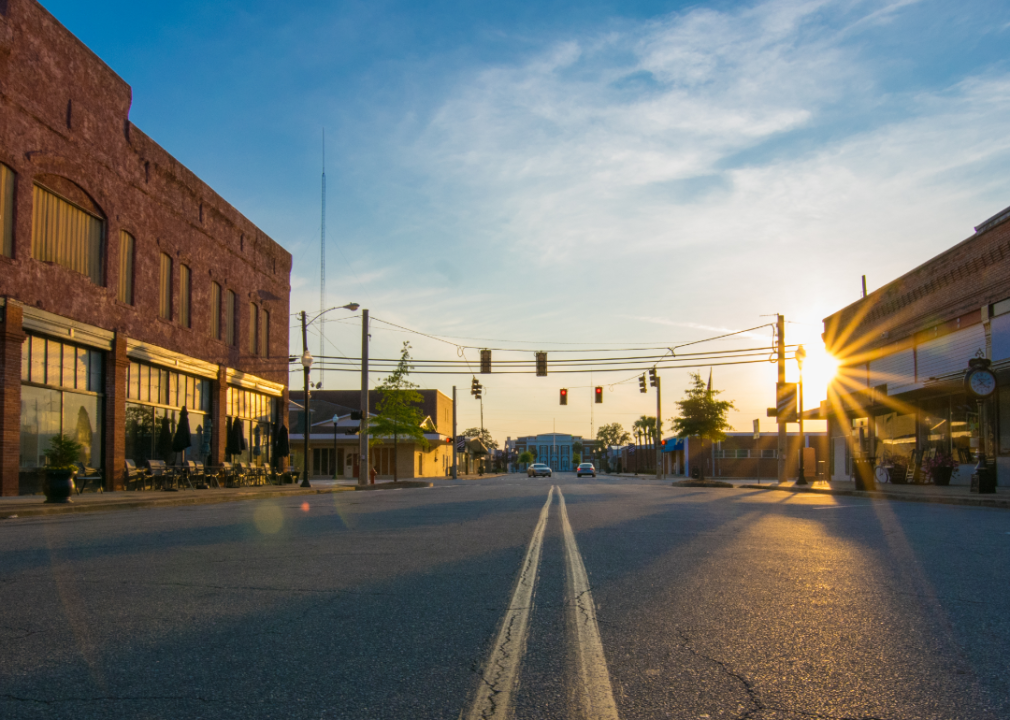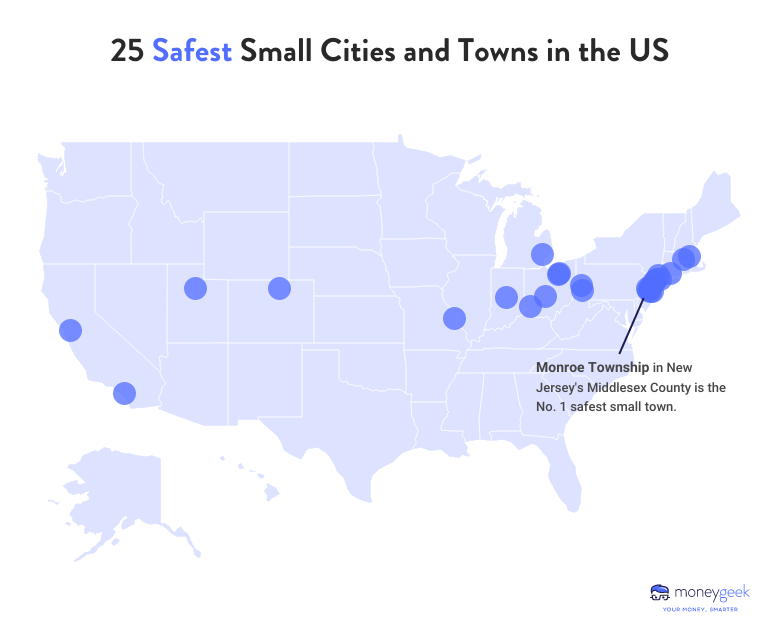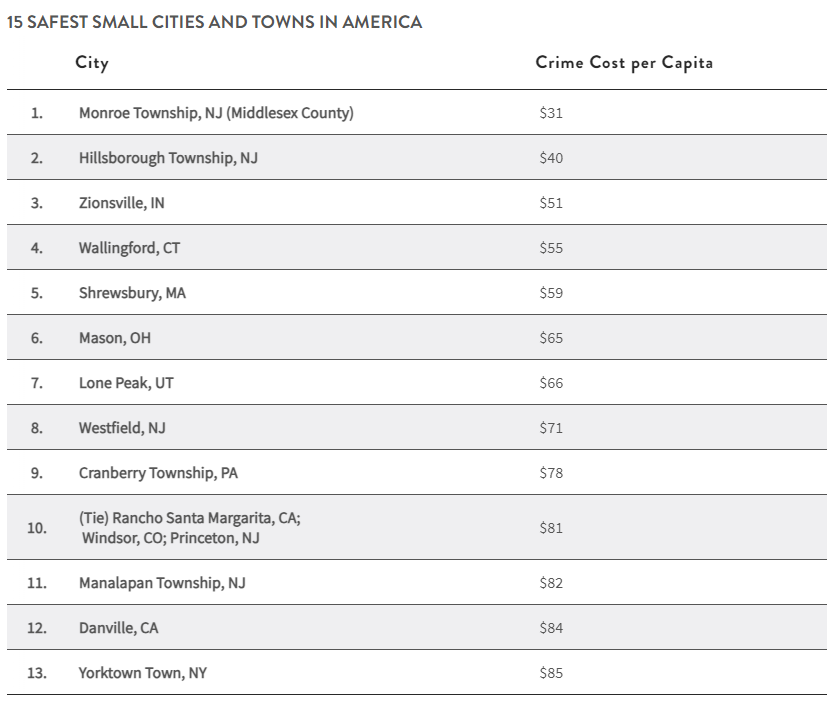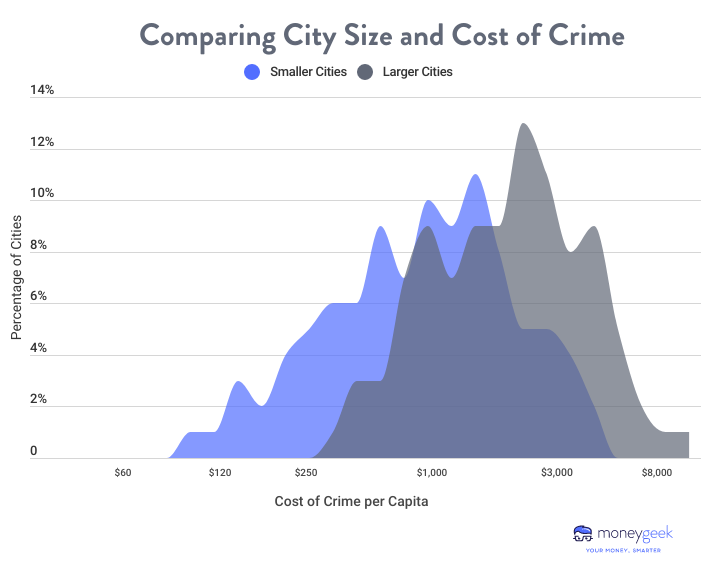Are small towns actually safer than big cities?

Canva
Are small towns actually safer than big cities?
sunset on main street in a small town
Crime takes a toll on communities — not just emotionally but also economically. In addition to direct costs from loss of property, services for victims, and policing and corrections, residents of higher-crime locales often pay higher rates on car insurance, homeowners insurance, and renters insurance.
Seeking respite in America’s smaller cities and towns has its appeal, but how much safer are small towns in reality? MoneyGeek analyzed crime statistics by quantifying the cost of crime and ranking 1,010 small cities and towns nationwide and in every state. Data on violent crimes such as murder, rape, and aggravated assault are included, as well as property crimes such as burglaries and car theft. This analysis is conducted annually and follows MoneyGeek’s ranking of the safest cities in America.
![]()

MoneyGeek
Key findings
map showing locations of 25 safest small cities and towns in the US
- The safest town in the U.S. is Monroe Township, located in New Jersey’s Middlesex County, a suburb of New York City.
- The average cost of crime in small cities was $1,155 per capita in 2022. Violent crime costs over $1,000 per capita, while property crime costs an average of $132. For context, violent crime accounted for 13.9% of all crime analyzed in this study, while property crime accounted for 86.1%.
- Overall, small cities and towns have 48% lower crime costs than larger cities.
- Some small towns still bear costs of crime comparable to large cities. Monroe, Louisiana, has a higher crime cost per capita than 297 of 302 large cities analyzed. Similarly, New York City has a crime cost comparable to two Arkansas cities, Springdale and Benton.

MoneyGeek
7 of the 10 safest small cities are in the Northeast
chart showing 15 of the cities in the U.S. with the lowest cost for crime
More than 50 million Americans live in small cities and towns, but how safe is small-town America? MoneyGeek analyzed crime statistics and quantified the cost of those crimes to identify the safest and least safe small cities and towns — those with 30,000 to 100,000 residents.
Most of America’s safest small cities and towns are in the Northeast, with six of the top ten cities in New Jersey, Connecticut, Massachusetts, and Pennsylvania. Cities and towns in Indiana, Ohio, Utah, and California round out the rest of the top ten. The least safe towns are distributed primarily across the South, with Monroe, Louisiana, at the top of the list.
Navigating the landscape of America’s small cities and towns reveals a diverse picture of safety. From Alabaster, Alabama, with a crime cost per capita of $245, to Laramie, Wyoming, at $664, these areas represent the safest small locales for residents in each state.

MoneyGeek
Are small cities and towns safer than big cities?
graph comparing city size and cost of crime
According to the data for large and small cities, small cities and towns tend to be safer than large cities. In fact, the violent crime rate in large cities was nearly double that of small cities. However, the distribution of crime costs also shows a significant overlap between crime costs in large cities and smaller cities and towns. In that overlap, small and large cities may have the same per capita cost of crime.
The data show many unsafe small cities and towns with crime levels comparable to their big-city counterparts.
For example, the per capita cost of crime in the least safe small and large cities is comparable. In Monroe, Louisiana, the least safe small city, the per capita cost of crime is $8,902. That’s higher than in large cities like Baltimore, Maryland, and Cleveland, Ohio, where the per capita cost of crime is $8,160 and $7,397, respectively. Benton, Arkansas, (pop. 36,282) has a cost of crime per capita of $1,727, comparable to New York City (pop. 8.2 million), which has a crime cost per capita of $1,722.
While the safest places to live tend to be smaller, there is not a perfect correlation between population size and crime levels.
Methodology
To rank the safest small cities and towns in the United States, MoneyGeek started with standardized crime statistics reported to the FBI from 2022, the latest year of available data. To determine crime rates per 100,000 people, population data accessed from the FBI was added to the analysis. This analysis focused on cities with a population between 30,000 and 100,000 residents and included 1,010 cities in the ranking. Please note that 2022 data was not available for small cities in Florida, Illinois, Maryland, and Pennsylvania. When cities did not have data available in the FBI dataset, MoneyGeek conducted individualized research on standardized crime statistics for each specific city or town.
MoneyGeek relied on research by professors Kathryn McCollister and Michael French of the University of Miami and Hai Fang of the University of Colorado Denver to determine the cost of crime to society. Their findings were integrated into the broader data set to better understand the societal cost of crime within individual cities.
The data points presented are defined as follows:
- Crime Cost per Capita: Societal cost of crime per resident.
- Violent Crime Rate: Composed of four offenses: murder and nonnegligent manslaughter, rape, robbery and aggravated assault per 100,000 residents.
- Property Crime Rate: Includes burglary, larceny-theft and motor vehicle theft offenses per 100,000 residents.
- Cost of Crime: Economic losses attributed to crime and its cost to society (individuals, community, and nationally) in millions.
This story was produced by MoneyGeek and reviewed and distributed by Stacker Media.